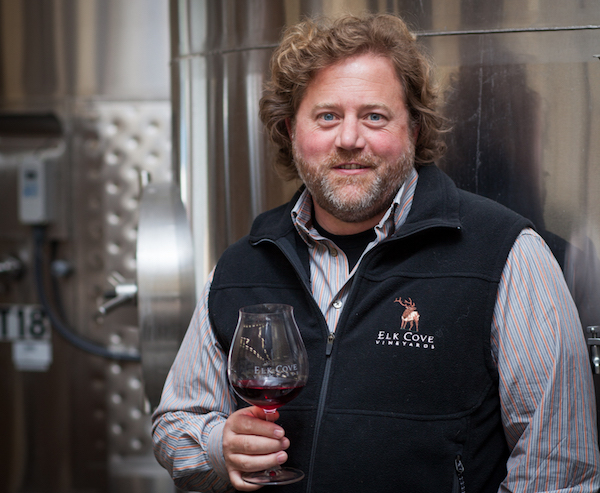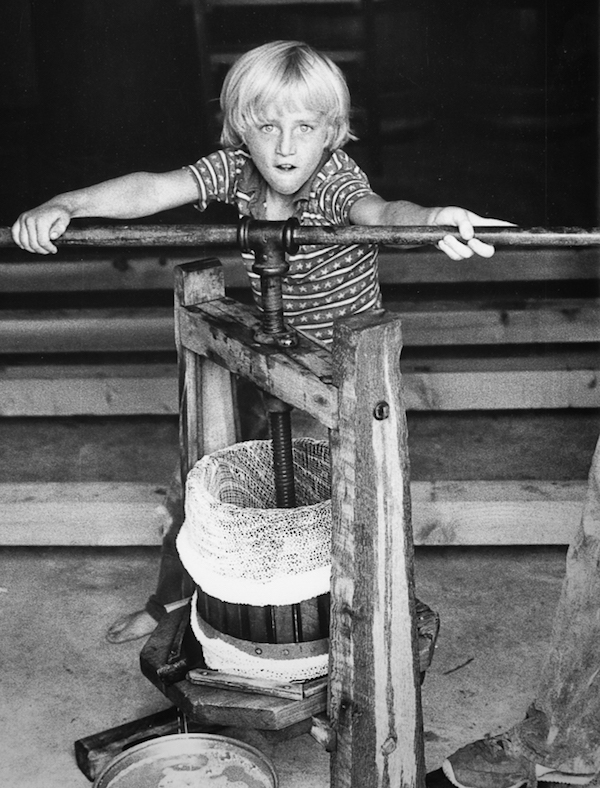
GASTON, Ore. – As a kid, Adam Campbell thought his parents’ friends were kind of crazy.
Campbell’s parents, Joe and Pat, moved from the Hood River area to Gaston in 1974 to plant wine grapes and quickly became friends with folks like David Lett, Dick Ponzi, Dick Erath and David Adelsheim.
“They’d get together and drink wines from around the world, get inspired, passionately debate and talk about how to make this thing happen in Oregon,” Campbell recalled. “My brothers and sisters and I would sometimes get tired of our parents talking about Pinot Noir all the time.”
Yet those conversations and his parents’ work ethic impressed upon Campbell that he should follow in their footsteps, first as a grape grower and finally as a winemaker.
For the past two decades, Campbell has helped run Elk Cove Vineyards, the winery his parents started early in the history of the modern Oregon wine industry.
We recently caught up with Campbell and sat down to talk about Elk Cove and the philosophy he brings to viticulture and winemaking. Here’s the interview:
[powerpress]
Growing up in Gaston

Campbell is a fifth-generation Oregon farmer, yet he was born on the Pine Ridge Indian Reservation in South Dakota. That was simply because his father was a doctor who was sent there to work when he was drafted into the military during the Vietnam War.
When they returned to Oregon, it was to Parkdale, a farming community at the base of Mount Hood, where his grandfather was a pear farmer. Then they heard rumors of wine grapes being planted out west of Portland in the Willamette Valley. The Campbells loved wine and quickly became enamored with the idea of helping to create an industry.
So in 1974, they headed to Gaston, a tiny community in northern Yamhill County, today about 45 minutes from downtown Portland.
“They came here to check it out and bought an abandoned prune orchard and set up shop,” Campbell said.
Campbell and his siblings attended Yamhill-Carlton High School, where he was pals with Jason Lett (whose father planted the first Pinot Noir in the Willamette Valley) and Alex Sokol Blosser (whose parents started Sokol Blosser in the Dundee Hills). While all the other kids’ parents were farmers, Campbell’s family stood out.
“I learned somewhere around fourth or fifth grade that my parents were pretty alternative in what they were choosing to do,” he said with a laugh. “It was definitely thought of as a weird thing that was not going to work out.”
Ironically, Yamhill-Carlton High School now has an agriculture program that focuses on viticulture, and there’s a demonstration vineyard on campus.
While Campbell was proud to see his parents’ wines on store shelves, his greatest impression was that it was a lot of hard work, and he wasn’t sure that he wanted to do that with his life.
Coming back to Elk Cove Vineyards

The wine industry was his parents’ dream, not his.
It’s hard to imagine doing what your parents do when you’re 18 years old, so Campbell went to Lewis & Clark College in Portland and earned a degree in political science. Then he moved to Australia and fell in love.
But after spending a year Down Under and getting married, his thoughts wandered back to the family vineyard in Gaston.
“That’s when I really started missing the vineyard and where I grew up,” he said. “I was fortunate to have my wife come join me. I said, ‘I really want to do this.’ I didn’t know what aspect of it.”
At first, Campbell focused on the viticulture side without a lot of interest in winemaking. But he ultimately came around.
“Once you put all that love into managing vineyards, then you want to take it to the next step.”
His parents had put 27 years into Elk Cove Vineyards and had turned it into a moderate success. But they were weary.
“I think compared to today, it was really a lot of hard work,” Campbell said. “They were kind of done with it by the time I decided to come back, and they were happy to have fresh energy and to see that I was passionate about wine, passionate about being entrepreneurial – not just doing what they do and continuing the business but to expand it.”
Today, Elk Cove is a fairly large operation, with Campbell and his team crafting several different Pinot Noirs each vintage, as well as a focus on white wines such as Pinot Gris, Pinot Blanc and Riesling.
Campbell has launched Pike Road, a sister brand to Elk Cove that started this spring with affordable Pinot Noir and Pinot Gris and already is sold in nearly half the country. There’s even a standalone tasting room for Pike Road in downtown Carlton.
Elk Cove Vineyards focuses on estate grapes

In the past few years, a lot of vineyards have been sold – either to local wineries or outside investors. The result has been that many wineries have lost some of their longtime grape sources.
Campbell is well aware of this trend, and he’s done something about it: developing his own fruit sources.
Today, Campbell farms 350 acres of vineyards, including his parents’ original land.
“When I came back and took over for my parents, we just had our 40 acres,” he said. “We were buying a lot of fruit because at the time we wanted to grow our business, but that’s all we could afford to plant.”
But eventually, he was able to secure funding to buy existing vineyards, as well as bare land that he could plant. And starting with the 2016 vintage, Elk Cove Vineyards will become 100 percent estate-grown wines.
“With new projects coming in all the time and vineyard sources getting purchased by other people, it’s important,” he said. “It’s also respect for the fact that over the years, we feel like we do really good-quality viticulture. We know what to do. We know where to plant vineyards. We know the soils we like. The highest-quality fruit we can get is our estate fruit. At the end of the day, there’s no one to get the blame or the credit except yourself.”
While Pinot Noir is the focus, Campbell has a special love for Alsatian white wines, having spent a summer in that region of France. He brought that passion back to Oregon, and today he makes some of the finest Pinot Gris in the Pacific Northwest.
“I have almost 100 acres (of Pinot Gris) on various sites, and I love that freshness and vitality you can get from an aromatic white wine. Our preferred style is to make it in stainless steel to capture the fruit and the freshness.”
He is similarly jazzed about Riesling, and he’s even planting more of it because he loves the grape so much.
Today, thousands of visitors stop by Elk Cove each year to taste the wines and explore the 200-acre property that still has the same herd of Roosevelt elks that roamed nearby when he was a kid.

Leave a Reply